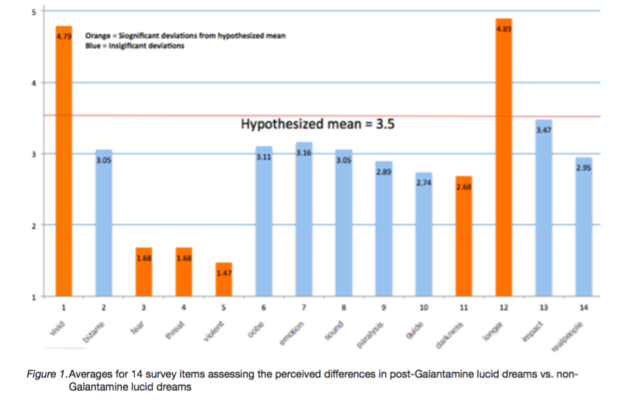I realized today that this month is the 9 year anniversary of the Dream Studies Portal. That blows me away. What started out as a blog meant to keep me writing after leaving grad school is now announcing the results of my own original dream research.
So, to the research: the galantamine research I conducted with Scott Sparrow and Ralph Carlson has been published in a peer-reviewed journal, The International Journal of Dream Research.
You can check out the abstract here and download the PDF for free.
Thanks to all readers who participated in this research!
Galantamine, as you may know, has quite the reputation as THE lucid dreaming pill in the lucid dreaming community, but there has been little research on the topic of its effects on dreams, despite its well-studied effects on improving memory.
We didn’t focus on the question of “can galantamine induce lucid dreams?” (that would need a clinical study) but rather “how does galantamine affect the qualities of lucid dreams?”
Now, our study is retrospective, meaning we analyzed what people reported are the differences between their lucid dreams that are preceded (or not) by galantamine. This means that the study has some serious limitations. In a sense, retrospective studies of this sort illuminate “the culture” of an idea, or its folk phenomenology.
Still, it’s a good first step, and the results are fascinating. We found strong statistically significant results for galantamine-preceded lucid dreams for increasing the vividness and length of lucid dreams. We anticipated these results, as this is what fuels the reputation of the substance.

We also found a surprising negative correlation: lucid dreams preceded by galantamine are associated with less fear, violence, and threats. These results are surprising as there have been some anecdotal accounts that galantamine makes dreams more bizarre and nightmarish, and also may induce sleep paralysis. In fact, I’ve personally experienced this!
Yet, in our study, galantamine-preceded lucid dreams appear to dampen fear and related negative effects. We are intrigued by this, as it could be that galantamine plays a healing role for the brain when it comes to memory retrieval and trauma. If this turns out to be the case, in the future it could be adjunctly used in lucid dreaming therapy sessions for those suffering from repetitive PTSD nightmares.
Or, these results could simply indicate that lucid dreamers are expecting that galantamine will give them good experiences, and that’s what they are getting (or remembering after the fact). That’s why our next step is to actually do some placebo testing of galantamine for lucid dreamers.
We are hoping to get this next stage of our research going later this summer or early fall — so watch this space as you may qualify as a test subject!